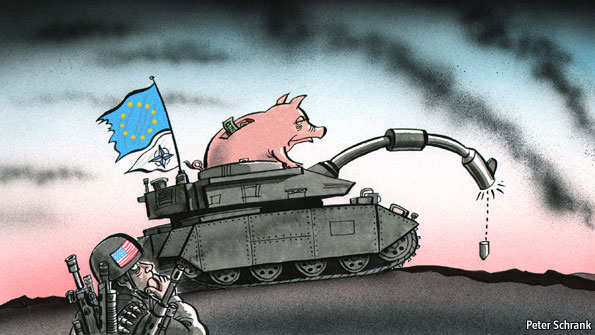
From Craig Whitlock, the Washington Post: NATO allies are confronting a sustained weakening of the military alliance as ailing economies are forcing nearly all members, including the United States, to accelerate cuts to their defense budgets at the same time.
The Pentagon’s recent decision to eliminate two of the Army’s four brigades in Europe is the latest blow to NATO’s military capabilities. It extends a year of grim announcements from members of the alliance that they can no longer afford their security commitments and that a long period of austerity is in the offing.
Obama administration officials warned last year that European members of NATO could no longer expect the United States to shoulder a disproportionate burden of maintaining the 28-member alliance, the bedrock of trans-Atlantic security and diplomacy since the end of World War II. The United States accounts for 75 percent of all NATO defense spending, up from 50 percent during the Cold War.
Instead of coming forward, however, European members of NATO are in retreat. Britain announced troop cuts this month that will eventually shrink the size of its army by nearly one-fifth; it already has mothballed its only aircraft carrier.
Germany is trimming the size of its armed forces by a similar amount and canceling orders for fighter jets, helicopters and other weapons systems. Italy, which imposed deep defense cuts two years ago, is confronting another round that could include steep reductions in the number of F-35 Joint Strike Fighters — a U.S.-made plane — that it had planned to buy. . . .
U.S. and NATO officials fret that the cutbacks will further erode military weaknesses that were exposed during last year’s air war in Libya. Several European countries quickly ran out of munitions and had to order them on an emergency basis from Washington. European militaries also lacked capability to refuel their own planes or conduct adequate surveillance from the air.
“If there ever was a time in which the United States could always be counted on to fill the gaps that may emerge in European defense, that time is rapidly coming to an end,” Ivo Daalder, the U.S. ambassador to NATO, told reporters in Washington last month.
At the same time, Europe’s austere economic outlook is leading to a “further weakening of the core ability to defend ourselves,” said Norwegian Defense Minister Espen Barth Eide. (graphic: Peter Schrank/Economist)
Image: economist%206%2018%2011%20Europe%20military%20failings.jpg
